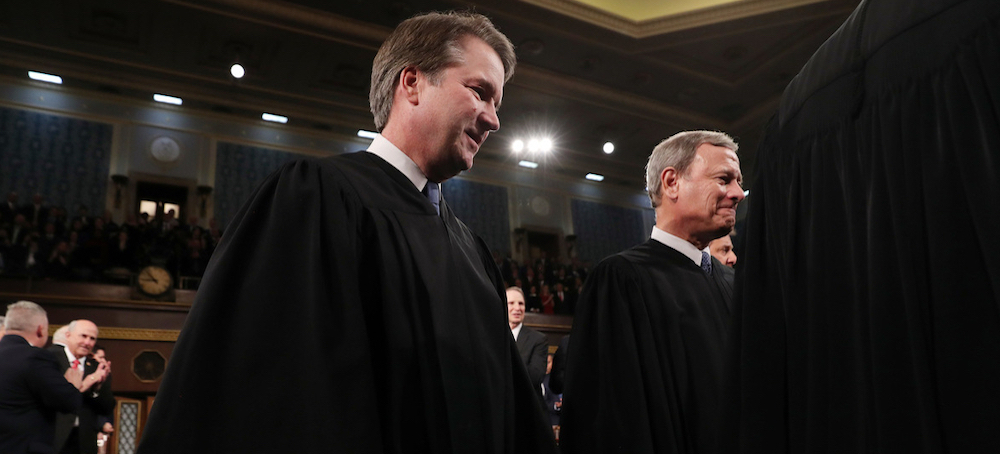Information Warfare and the Supreme Court Presidential Immunity Case
Ruth Ben-Ghiat Substack Justice Brett Kavanaugh and Chief Justice John Roberts. (photo: Getty Images)
Justice Brett Kavanaugh and Chief Justice John Roberts. (photo: Getty Images)
ALSO SEE: Ruth Ben-Ghiat | Lucid (Substack)
Thanks to the Supreme Court, ideas that are at the very heart of autocracy —such as a head of state’s right to kill someone or stage a military coup and not be held accountable— are being given serious treatment, with the pros and cons of these ideas being considered by individuals who occupy positions of immense influence and power.
Giving these extremist ideas such an important venue is a huge win for the far right, regardless of the legal outcome.
Republicans have been waging legal war on our democracy, using the courts to take away our reproductive, voting and other rights, and they have been waging a parallel information war that sets the stage for the reception of those legal arguments and decisions.
The decision of the Supreme Court to hear arguments about the need for Trump to have total immunity from prosecution is a victory in itself for far-right information warfare, because it prepares public opinion to consider dictatorship as a possibility for America.
To normalize extreme ideas, you get them circulating through institutions and the public sphere, aiming for prestigious platforms that offer maximum legitimacy. Enter the Supreme Court, which is making itself the tool of bad actors who want issues that should be settled in a democracy seen as up for discussion–including whether a head of state can order an assassination of a political rival and pay no consequence.
Rather than refuse the case and act as a democratic guardrail, the Court chose to accept it and give press to the idea that a president who already incited a violent coup to stay in power illegally might have the right to immunity.
Information warriors work hard to get their messengers and messages into venues where they can have the most impact beyond those who are already converted to their cause. Even though the court includes far-right activist justices such as Samuel Alito and Clarence Thomas who no longer seem to believe in democratic notions of justice, the myth of its objectivity makes it an ideal vehicle for the normalization of extremist ideas.
“It is naïve and ahistorical to pretend that the U.S. Supreme Court floats above politics as a quasi-sacred institution,” Washington Post columnist E.J Dionne Jr. recently observed. The refusal of Justice Thomas to recuse on Trump-related cases, even though his wife Ginni was an active part of the Republican conspiracy to overthrow the government after the 2020 election, should puncture that myth for good.
The procedural demands of court business are making things worse. Once admitted to the court, arguments of both sides must be heard and taken as being made in good faith. That is how Americans came to hear progressive Justice Ketanji Brown Jackson consider “both sides” of the immunity discussion. Justice Jackson noted that one side fears that not having immunity could chill a president’s ability to “do what they want in office,” while the other side worried that immunity would leave a president “unbounded while in office.”
Yet Justice Jackson went to the heart of the matter in stating the real stakes of an immunized U.S. president. "The most powerful person in the world with the greatest amount of authority could go into office knowing that there would be no potential penalty for committing crimes. I'm trying to understand what the disincentive is from turning the Oval Office into the seat of criminal activity in this country,”
Michael Dreeben, arguing on behalf of Special Counsel Jack Smith, spelled out what that criminal activity might mean: ”bribery, treason, sedition, murder—and, here, conspiring to use fraud to overturn the results of an election and perpetuate himself in power.”
The essence of authoritarianism is re-arranging government so the leader and his cronies can get away with crimes. That’s what Vladimir Putin, Xi Jinping and other despots Trump admires have achieved.
The Supreme Court Justices who favor empowering Trump may want to look at what happens to courts of every rank and type in states governed by such leaders.
Adam Serwer, writing in the Atlantic, gives us a clue. Just as a legislature would not want to convict a president who “could murder all of them” and, with immunity, declare it an “official act,” so too the Supreme Court “would probably not rule against a chief executive who could assassinate them and get away with it.”
In an autocracy, no one is safe and everyone can become a target, even those who helped to prepare the legal and propaganda climate for the leader’s absolute power to be accepted in society. That is the agenda the Supreme Court is lending itself to by hearing this case.



